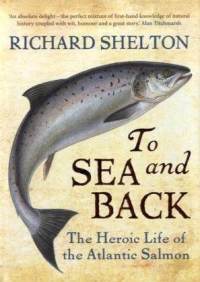To Sea and Back: The Heroic Life of the Atlantic Salmon – Richard Shelton

In his afterword, Richard Shelton says he wanted to write a book about “life’s meaning around the life cycle of the Atlantic salmon.” It’ll take me another reading or two to find life’s meaning here, but Shelton certainly ranges far and wide over fairly significant subjects. He is the chairman of the Atlantic Salmon Trust, but has had a varied career.
Shelton is a naturalist at heart, and loves the outdoors. The central thread running through this book is the amazingly complex life cycle of the Atlantic salmon, but there are digressions along the way into a wide range of subjects. Some of these topics, such as global warming (about which he is surprisingly sanguine), the ethics of whaling and life as a gamekeeper in Scotland at the turn of the 20th century can be considered tangentially relevant to the primary subject at hand. Others, such as the Reformation, the history of the use of rat skins in making clothing, and the virtues of insects as food, are bafflingly difficult to place in the overall arc of the narrative.
One is left with an impression that these fish, who are born in rivers (many in Scotland) and go through the stages called alevin, fry and parr, migrate to sea for a few years (at this stage they are called smolts), and then return as grilse to the river of their birth to breed and (eventually) die, posess a life cycle of enormous complexity. And this is true – the fish do not all return to their birthplace at the same age, or spend uniform amounts of time as a parr. Research into what triggers the various physiological changes in the bodies of the fish is difficult and time consuming given that they spend most of their lives in the open ocean. (I’d recommend Nature’s Great Events for a better visual idea of what salmon do when they return to their birth river to breed.)
Shelton also touches on the complexities of farming these fish. I was encouraged that there are some farms (Shelton mentions one in the north of Scotland) that seem to be succeeding in raising healthy, strong fish in humane conditions.
Shelton’s writing, however, sometimes actively works against the reader labouring to develop an understanding of these enigmatic fish, and I would have preferred a more linear narrative structure in order to better get a handle on the changes that are undergone by Atlantic salmon during their lives. In a sense this book can be compared to Mark Kurlansky’s book Cod, which also presents a fairly whimsical and nonlinear natural history combined with a recipe book.
Subjects of surprising depth and profundity are touched upon by Shelton, and I think it is important to read this book not simply as a natural history of a brave, magnificent fish but as the musings of a writer with wide ranging interests and life experience. I particularly enjoyed the sections concerning research cruises on oceanographic vessels.
You can read some other reviews of this book here, here and here.
Finally, here’s a useful word: anadramous, referring to a fish that spends most of its life in the sea but returns to fresh water to breed.
The book is available for purchase here if you’re in South Africa, otherwise click here.







